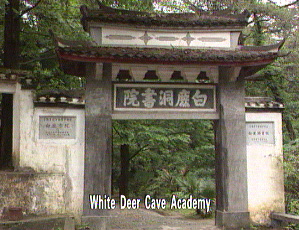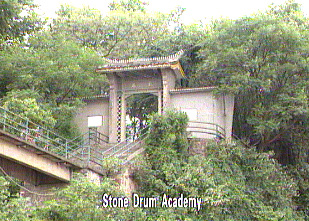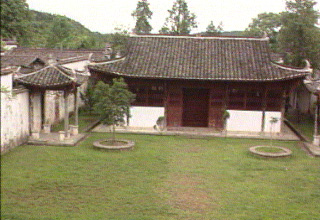 |
|
| Private Academies |
| CCTV.COM 2002-09-13 15:09:16 |
|
 Educational institutions in ancient China consisted of National University, Directorate of Education, and private schools. Private academy was a new form of educational institution that came into existence in the Song Dynasty. Educational institutions in ancient China consisted of National University, Directorate of Education, and private schools. Private academy was a new form of educational institution that came into existence in the Song Dynasty.
Though private academies were often established jointly by the government and civilians, they were where private teachers taught. They emerged because the study of Confucianism was very active in the Song Dynasty. They provided rostrums for scholars to discuss and spread their doctrines.
Every academy consisted of classroom, dormitory and library. Unlike government schools, private academies did not direct their aim at passing imperial examinations, but at cultivating talents who excelled in character and learning. Their curriculum and tests were more flexible too. They only provided a book list for students to study on their own and hold discussions. Debates were often held among academies. In the Song Dynasty, famous Neo-Confucianism advocators Zhu Xi and Lu Jiuyuan debated their opposing doctrines in Goose Lake Temple in Jiangxi. This was the famous "Goose Lake Debate" in Chinese history.
 Most private academies were located at picturesque hillside, for it was believed that students cultivate themselves better amid trees and hills, a concept adopted from Buddhism and Taoism. Yuelu Academy was located at the foothill of Mount Yuelu in Hunan; White Deer Cave Academy snuggled amid Five Elders Peaks on Mount Lushan, Jiangxi; Stone Drum Academy was situated in Stone Drum Mountain in Hengyang, Hunan; and Songyang Academy in Mount Songshan, Henan. Most private academies were located at picturesque hillside, for it was believed that students cultivate themselves better amid trees and hills, a concept adopted from Buddhism and Taoism. Yuelu Academy was located at the foothill of Mount Yuelu in Hunan; White Deer Cave Academy snuggled amid Five Elders Peaks on Mount Lushan, Jiangxi; Stone Drum Academy was situated in Stone Drum Mountain in Hengyang, Hunan; and Songyang Academy in Mount Songshan, Henan.
According to statistics, there were altogether 203 academies in Northern and Southern Song. Among them 80 were in Jiangxi, 34 in Zhejiang, and 24 in Hunan. The numbers showed that southern China was not only richer but also paid more attention to the cultivation of social customs and to education. The cities placing more importance on the development of culture and where more people gave donations to education were the places with more private academies.
 Under the influence of Zen Buddhism, private academies paid attention to an enriched spiritual life and the cultivation of character. They taught according to the students' aptitude, avoiding teaching for the sole purpose of passing imperial examinations. Nevertheless, they overlooked the training of skill and technique since they concentrated on Confucian classics. Private academies developed in the Yuan and were further promoted in Ming Dynasty. Although they manifested the people's abilities to run schools, they were unstable as compared to government schools. Under the influence of Zen Buddhism, private academies paid attention to an enriched spiritual life and the cultivation of character. They taught according to the students' aptitude, avoiding teaching for the sole purpose of passing imperial examinations. Nevertheless, they overlooked the training of skill and technique since they concentrated on Confucian classics. Private academies developed in the Yuan and were further promoted in Ming Dynasty. Although they manifested the people's abilities to run schools, they were unstable as compared to government schools.
The flourishing of private academies since the Song Dynasty embodied the cultural spirit of China's feudal society in its later period. They are an important heritage of China. Their free educational institution, teaching method and academic atmosphere are drawing more and more attention from various factors at home and abroad in the present information era which places such importance on knowledge and education.
|
|
Editor: Liu Baoyin CCTV.com
|
|
|
|
|
|
 |









